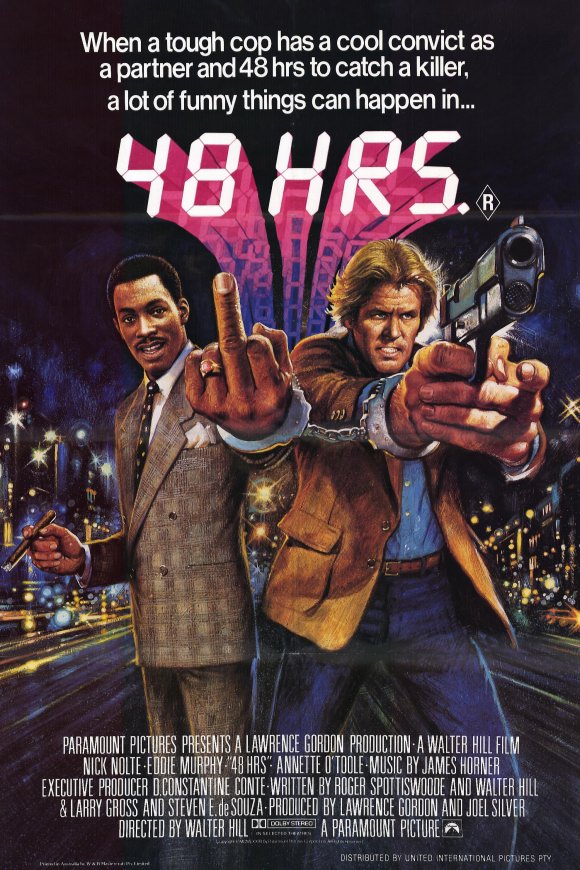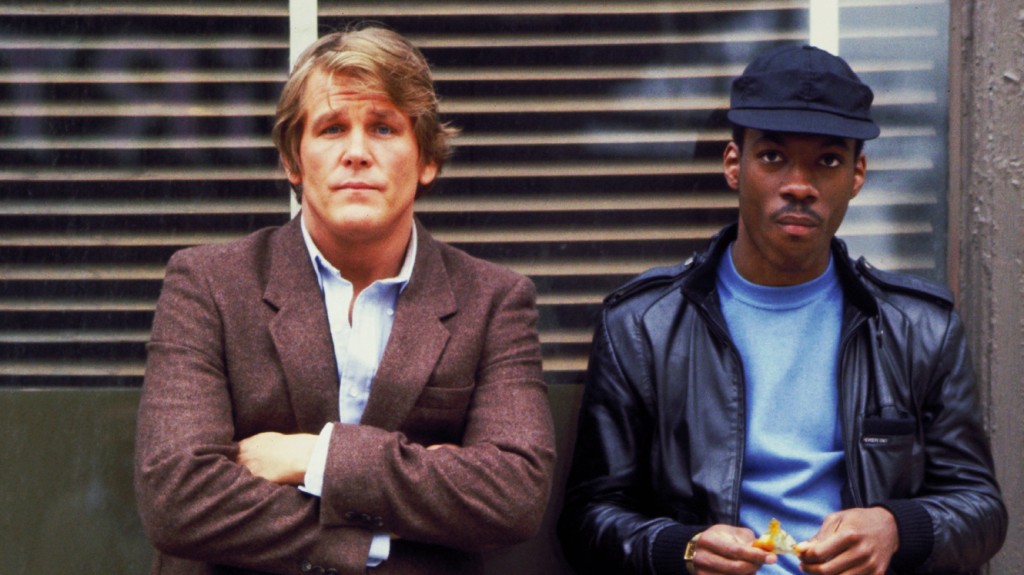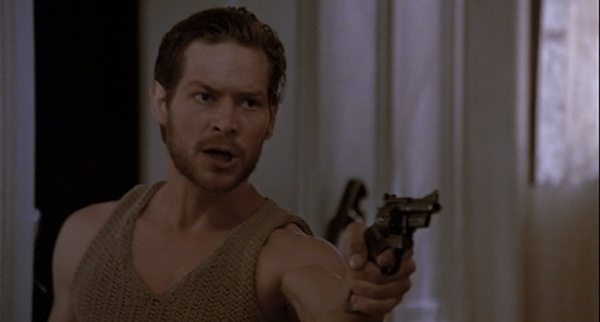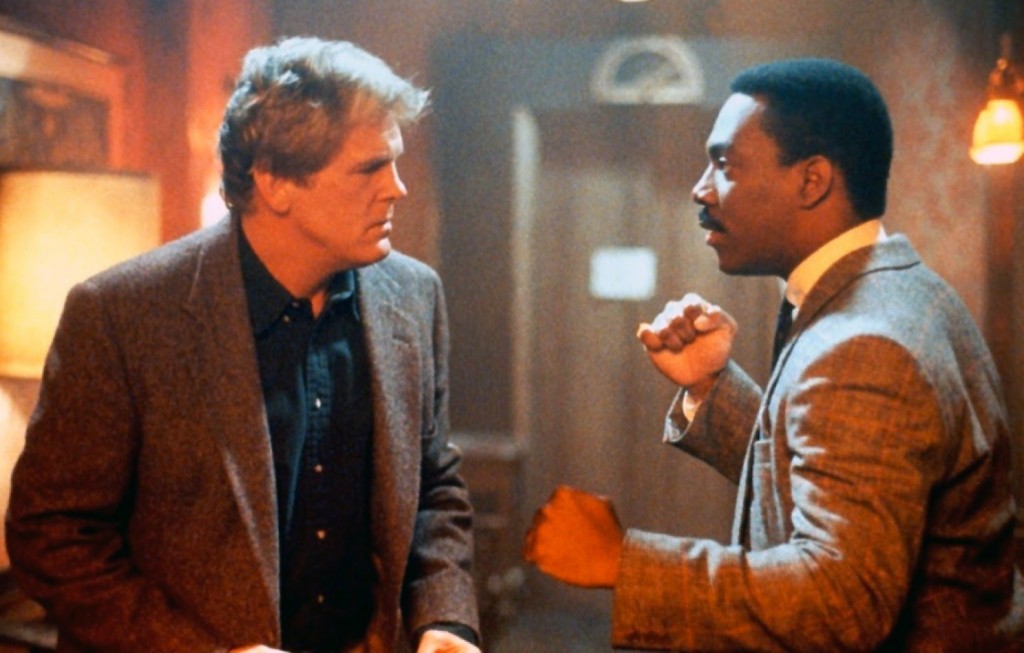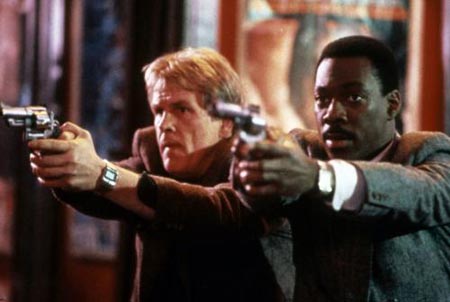Each week in November, the Deadshirt crew is partnering up for a look at cinema’s defining Buddy Cop movies. Up first: Dominic Griffin and Max Robinson tackle the racially charged sleaze thriller 48 Hrs.
48 Hrs. (1982)
Directed by Walter Hill
Starring Nick Nolte and Eddie Murphy
Max: We’re kicking off Deadshirt’s investigation into the great American sub-genre is the Buddy Cop movie with a look at what’s arguably the prototype for every “He’s a ___, he’s a ___” crime flick, Walter Hill’s 48 Hrs. This movie’s pretty interesting historically, both because of its legacy and the sheer volume of talent attached to it. Even beyond the fact it’s Eddie Murphy’s first movie and features character actor mainstays like James Remar and David Patrick Kelly, it’s also the first collaboration between eventual Die Hard screenwriters Steven de Souza and Jeb Stuart.
Dom, let’s talk about this amazingly unpleasant movie!
Dom: Going into this, I didn’t realize this was Eddie’s first movie or that this effectively invented the buddy cop genre we all know and love. The thing that stood out the most to me is that the formula just isn’t there quite yet. This is a brutal, rough film that also happens to house some spectacular comedy, but it does very little to successfully blend the humor with the sharper edges of its crime narrative. This dichotomy at the heart of the picture is clear in its two stars.
There’s Nick Nolte as Jack Cates, a blunt instrument of a man with booze for blood and fists like anvils. He’s like some comical byproduct of what would happen if Bukowski made detective fiction. For the first twenty-five minutes or so, it’s his movie. He’s the quintessential lone wolf cop who doesn’t play well with others, and nothing about the storytelling implies it’s going to shift gears into what would become the well-worn buddy cop structure. It just feels like a harsh, exhausting police flick. It’s almost, like, Not Good.
But then Reggie Hammond comes in and lights a fire under this movie’s ass. Murphy at his most dynamic is always a delight, but seeing him here like a flame just lit, still years away from his considerable gifts being watered down, is just astonishing. Before we start dissecting this proto-bromance, we should probably lay down the plot.
Max: The plot, such as it is, finds Cates missing his gun after escaped convict Albert Ganz (Remar) catches him flatfooted and shoots another officer (Jonathan Banks!). Cates springs Ganz’s former associate (Hammond/Eddie Murphy) in order to track him down. It’s not a particularly easy to follow or interesting storyline and, really, this is a showcase for Murphy more than anything.
Dom: Exactly! The real sweet spot, as in any future buddy cop flick, is the interactions between Nolte and Murphy which, let’s be honest, do not start off easy to watch. It’s 1982, so it isn’t too shocking to hear a lot of racial epithets hurled around, but there’s something very specific about the hateful vitriol Cates spews in Hammond’s direction. It’s a raw, almost casual kind of disdain that, in the thirty some odd years since, hasn’t been quite matched on screen. This movie houses maybe the most honest portrayal of the relationship between white cops and black criminals, and it’s buoyed by two performers who each embody an extreme depiction of their race.
Nolte is SUPER whitebread, embodying every stereotype of a soused law enforcement officer in the book. He doesn’t play by the rules, perpetually puts off typing out reports for the next day, and neglects his requisite love interest. But Murphy, as Hammond, presents an electric portrayal of blackness. His character is fascinating in a lot of ways, especially when you compare Reggie Hammond to every other black comedian who’s played a crook in a future rip off of this film. He’s depicted with an intelligence and wit that guys like Chris Tucker just wouldn’t get to exhibit in movies like Money Talks. Hammond is crafty as fuck AND poses a legitimate threat. He’s not just the comedic relief who gets pummeled like a Roger Rabbit background player. The mid-film throwdown between Cates and Hammond is almost as iconic as Roddy Piper and Keith David’s brawl from They Live. It puts the two stars on equal footing, particularly in their private interactions, even though the world around them still looks at Reggie like a piece of shit. The film makes it perfectly obvious that Reggie is a much better criminal operator than Cates is a cop. Begrudgingly, as the film moves along, Cates even seems to recognize this himself.I’d read a series of crime novels where Reggie goes straight and becomes a private eye.
Max: One of the frustrating parts of this movie is it feels like Murphy’s Reggie Hammond should be more of a lead with Nolte’s Cates as more of a supporting straight man. It’s not hard to see why we essentially got this two years later with Murphy’s other big action franchise, Beverly Hills Cop.
48 Hrs. is, on many levels, about bigotry. Not just Cates’ unremarked-upon casual racism either, but also in how Hammond gleefully takes the opportunity to pose as a cop in order to intimidate a bar full of white good ol’ boy racists or even Ganz’s racism toward his native american criminal cohort (Predator star/future unsuccessful Libertarian politician Sonny Landham). If this movie had come out five, ten years later I’d say this was intentional but here I think 48 Hrs. is just A Product Of Its Time.
Dom: Yeah, it’s certainly not intentional. The movie having four credited writers is obvious when you see how the whole thing barely hangs together between the warring tones. But with individual scenes, the thing really shines. There are two that stand out to me, and you already referenced one. When Reggie owns the shit out of this whole cowboy bar, I cackled and applauded so hard. It’s a total power fantasy, but it also highlights something Reggie tells Cates in the preceding scene, that a gun and a badge let someone do whatever they want. It’s an equalizer. This set piece is easily one of the greatest things Eddie Murphy’s done in his entire career. It’s such a commanding series of moments, operating on multiple levels. It’s entertaining because he’s an inherently humorous screen presence, but he’s also just straight up acting his ass off here. It doesn’t feel like “comedian Eddie Murphy thrown into a cop movie.” He makes Reggie this unique character that Axel Foley never quite matched in his later films.
The other scene is near the end of the second act when Cates is found out and his black boss is chewing him out. The captain calls Hammond a nigger and Cates, who has done the same thing countless times at this point, bolts upright to defend Hammond. In a film more purposely concerned with race, this would be a cloying moment letting the white guy get off for being a huge scumbag by briefly showing the bare minimum of human decency, but the way Nolte plays it is incredible. In the scenes leading up to it, in his own eccentric little way, Nolte sells that Cates really has grown to like and respect Hammond. When Hammond backs Cates up telling the captain to cut him a little slack, both men present a mutual appreciation that’s genuinely touching in an otherwise barbaric mess of a film.
Eventually, every buddy cop movie had to have a scene like this, but before it became a perfunctory bullet point in some LA screenwriter’s outline, it was a powerful, stirring moment of catharsis here.
Max: 48 Hrs. is a movie where it makes sense that so many different movies saw this formula and, by and large, improved on it. It’s sort of an uneasy middle ground between the kind of heavy straight drama of In the Heat of the Night and something that’s all quips like say Rush Hour. Does it work all the way? No. But, like you said, there’s enough redeemable memorable stuff here too.
Dom: For all its flaws, 48 Hrs. was fertile ground for future films to reap the benefits from. The experimentation here created a reliable blueprint for box office success that other films would improve upon before the dense proliferation of cookie cutter imitators flooded the market. But even here, the central piece of a successful buddy picture is intact: two amazing performers with serious chemistry learning to accept their differences to work together. It’s cheesy, sure, and as the years go by, people who make buddy pics get lazier and lazier, but this one is special.
Check Deadshirt throughout the month of November for more Buddy Cops!

